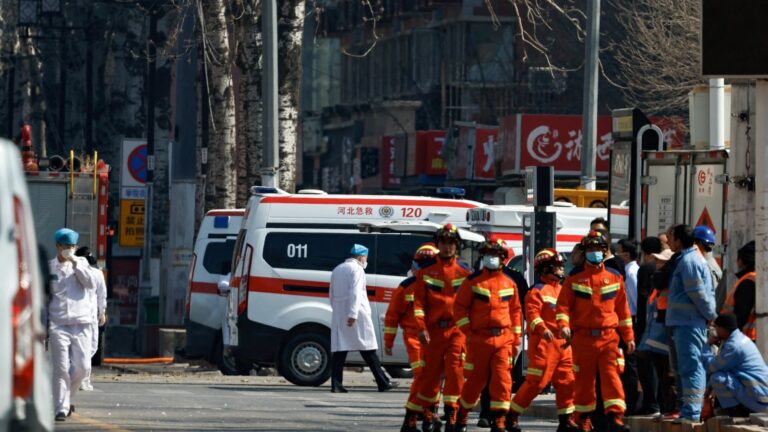China has tightened regulations on responding to accidents and disasters, increased penalties for officials who respond poorly, and stepped up government oversight of media reporting on emergencies.
The legal changes, announced late on Friday, aim to “improve emergency prevention and response capabilities” and improve how information about natural disasters, accidents and public health emergencies is communicated.
Some media analysts said the government’s reporting guidelines could further tighten restrictions on and access to the media in a country already on constant alert for reports that could harm social stability and security.
An increase in extreme weather events has tested China’s emergency response capabilities in recent years, with floods and droughts becoming more severe. Earthquakes and other disasters also pose challenges for local authorities in remote and rural areas.
Amendments to the Emergency Response Law, which take effect on November 1, will increase the maximum fine for failing to properly prepare for or respond to disasters fivefold to 1 million yuan ($140,000).
Official reporting guidelines will be strengthened. The law calls for strengthening the “news gathering and reporting system” in preparation for emergencies, but does not provide specific guidelines.
Government agencies must “guide” media organizations, “assist” them in conducting interviews and reports, and “supervise” public opinion.
The revised law states that news of emergencies should be “timely, accurate, objective and impartial,” emergency warnings should be issued promptly, and designated officials should be appointed to receive and convey warning information to public and crowded places.
“While the stated aim is to increase accuracy and objectivity of information, the new law further strengthens the state’s monopoly on the flow of information,” said Katja Dringhausen, head of the politics and society program at the Mercator China Institute, a European think tank.
Jemima Steinfeld, CEO of UK-based Index on Censorship, said the changes would create tougher conditions for journalists covering emergencies.
The amendment passed by the Standing Committee of the National People’s Congress adds more than 30 clauses to the 2007 law.
The law prohibits government agencies from directing others to delay reporting information, falsely reporting or concealing information, or obstructing others from reporting information.
In the past, slow response by authorities in disaster management has led to public backlash.
A hospital fire in Beijing last year that killed 29 people sparked online controversy after official news was only released eight hours after the incident.
And last year, Taozhou residents complained they received no warning and that authorities “disappeared” when unprecedented floods hit the city.
The revised law requires foreigners in China to abide by the law and comply with decisions and orders of local governments.
“Overall, this signals that foreigners living and working in China, the media, and international companies based in China need to pay close attention to the new regulatory system on crisis preparedness and political expectations in the event of an emergency,” Drinhausen said.
Foreign journalists may encounter grassroots resistance and obstruction while reporting on accidents or disasters on the ground.
In 2021, a German journalist reporting on flooding in the central Chinese city of Zhengzhou was targeted by an angry mob who accused the foreign journalist of “slandering everything about China,” German media outlet DW reported.
Journalists working for Chinese state media have also been harassed.
In March, reporters from the state broadcaster and other media were obstructed and shoved while covering an explosion at a fried-chicken restaurant in the city of Sanhe near Beijing, prompting an unusual statement of protest from the association that oversees China’s journalists.
(1 dollar = 7.2670 Chinese yuan)
(Reporting by Liz Lee and Ethan Wang; Editing by Tomasz Janowsky, Alexander Smith and William Mallard)

